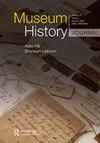Introduction: Museum histories in Aotearoa New Zealand: intersections of the local and the global
IF 0.2
Q3 HISTORY
引用次数: 2
Abstract
This special issue is the result of a two-day conference, ‘Held in Trust: Curiosity in Things’, sponsored by the University of Otago’s Centre for Research on Colonial Culture (CRoCC), and held at the Otago Museum, Dunedin, New Zealand, in January 2019. The gathering, which was prompted by the 150th year of the Otago Museum, focused on histories of institutional collections and collectors in Aotearoa New Zealand set within a global intellectual and commercial context. We would like to thank all the speakers and delegates for their individual and collective contribution to the success and stimulation of the outstanding event. The conference deliberately set out to enlarge museum history, which has largely been framed under the rubric of colonial domination or building cathedrals of science. Both notions are somewhat superficial and do not tell us much about the bigger stories that motivated the creation of the collections, particularly in the British colonial context of the colony that became New Zealand. While objects have the capacity to tell stories of lives and communities that are interconnected over space and time, this aspect is largely lost in the tendency to research specific object biographies and recount tales of eccentric collectors. In such approaches, the global context is often missing, especially the critical dimension of commercial trade and how exchange networks contributed to the patterns of knowledge discovery and creation. Objects are the tangible material world of scientific endeavour and during the nineteenth century trade in them boomed. Also overlooked are tales of the political context surrounding the discovery and translocation of objects. Acquisition histories dominate the field of the history of collecting and institutional histories run the risk of becoming bogged down in these empirical, albeit fascinating, approaches. The contributors to this special issue show how museums and collections are the result of a complex interrelationship between people, places and things and how these inform practices surrounding acquisition and knowledge generation. Through an interrogation of the formation of these social, economic and cultural assemblages, we can begin to understand how colonial museums were an integral part of these social and material connections. We also think that these articles about the history and development of museums in one colonial site have an application to colonial museums more broadly.简介:新西兰奥特罗阿的博物馆历史:当地与全球的交叉点
本期特刊由奥塔哥大学殖民文化研究中心(CRoCC)赞助,于2019年1月在新西兰达尼丁奥塔哥博物馆举行了为期两天的“信任:对事物的好奇心”会议。这次聚会是由奥塔哥博物馆成立150周年而举办的,重点是在全球知识和商业背景下,新西兰奥特亚罗瓦的机构收藏和收藏家的历史。我们要感谢所有发言者和代表,感谢他们个人和集体为这次杰出活动的成功和精彩作出的贡献。这次会议有意扩大博物馆的历史,这在很大程度上是在殖民统治或建造科学大教堂的名义下建立起来的。这两种概念都有些肤浅,并没有告诉我们很多激发这些藏品创作的更大的故事,特别是在英国殖民背景下的新西兰殖民地。虽然物品有能力讲述生活和社区的故事,这些故事在空间和时间上相互联系,但在研究特定物品传记和讲述古怪收藏家故事的趋势中,这方面在很大程度上被忽视了。在这种方法中,往往忽略了全球背景,特别是商业贸易的关键方面以及交换网络如何促进知识发现和创造的模式。实物是科学研究的有形物质世界,在19世纪,实物贸易蓬勃发展。同样被忽视的是围绕着发现和转移物品的政治背景的故事。收购史在收藏史领域占据主导地位,而机构史有可能陷入这些经验主义(尽管引人入胜)方法的泥潭。本期特刊的撰稿人展示了博物馆和藏品是人、地点和事物之间复杂相互关系的结果,以及这些关系如何为围绕获取和知识生成的实践提供信息。通过对这些社会、经济和文化组合的形成的拷问,我们可以开始理解殖民地博物馆是如何成为这些社会和物质联系的组成部分的。我们还认为,这些关于一个殖民地遗址的博物馆的历史和发展的文章可以更广泛地应用于殖民地博物馆。
本文章由计算机程序翻译,如有差异,请以英文原文为准。
求助全文
约1分钟内获得全文
求助全文

 求助内容:
求助内容: 应助结果提醒方式:
应助结果提醒方式:


